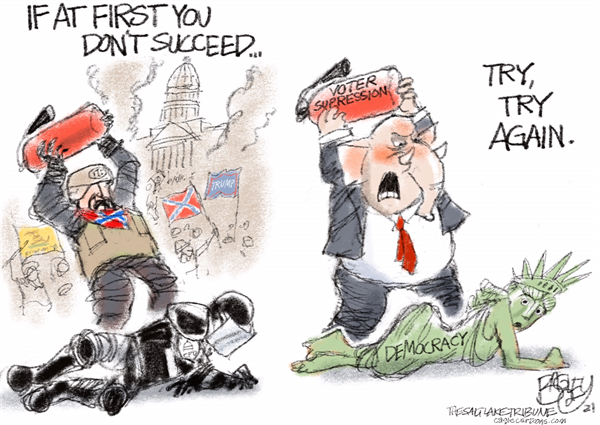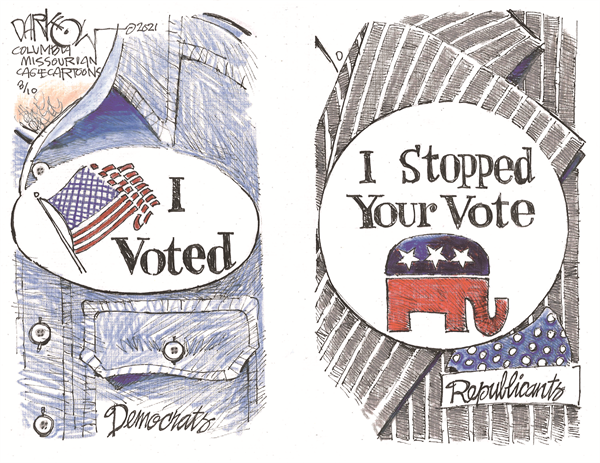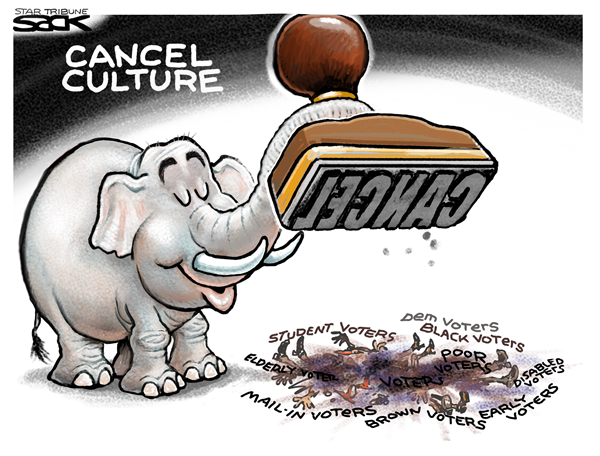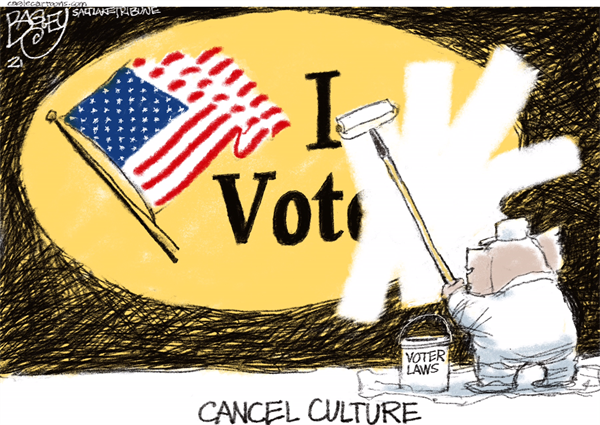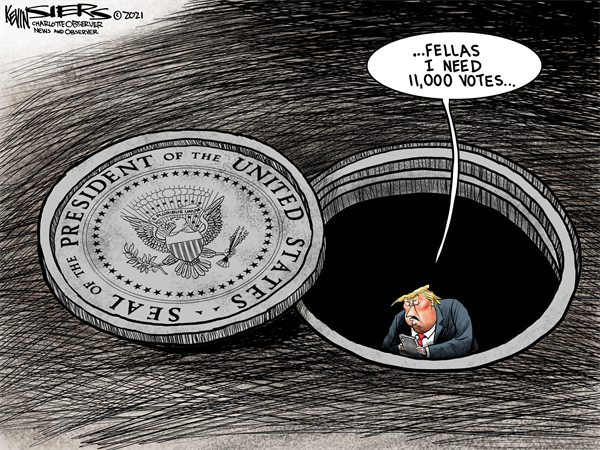State Trumplicans deploy national party strategy to fight proposed voter rights laws
By Will Collette
Republicans use political arithmetic as well as anyone. They know you win when you get more of your people to vote and less of their people to vote.
Instead of focusing on voter turn-out, however, the national
Republican strategy has focused more on voter suppression than turn-out.
After their losses in 2020, Republicans have re-doubled
their efforts to block the vote, Nearly 500 pieces of state legislation to make
it harder for people to vote have been introduced around the US, especially in
those states that flipped from Trump to Biden in 2020.
In Rhode Island, we already have a number of laws on the books
that make it hard for people to vote. Many of those restrictions were waived in
2020, giving us a chance to see for ourselves how such things as no-fault mail
voting, early voting, etc. work in practice.
Now there are a number of Democratic bills aimed at making
those pandemic-driven changes permanent and eliminating historic barriers for
future elections.
This has panicked Rhode Island’s Trumplican Party into
waging a down and dirty campaign to block these proposed laws to make it easier
for you to vote.
On Wednesday, March 17, the RIGOP sent out an e-mail saying “We Need 1,000 People to Protect Election Integrity in Rhode Island” and asking those 1,000 faithful to hand in written testimony by the following day opposing Senate bills S 516 and S 569.
They also submitted their own comments which I am copying below
in their entirety. I embedded my Rebuttal
to each argument in the appropriate place. I have used the same red colored
typeface the RIGOP uses in its e-mails to identify direct quotes from them.
The greatest rebuttal of all to Trumplican voter suppression arguments is the 2020 Election, hailed by all but the Trump/Q-Anon cult as the "cleanest, safest election on record."
Trump
also claimed massive voter fraud in the 2016 election which he won in the Electoral
College but lost in the popular vote. Trump claims he lost the popular vote
because “millions of illegal immigrants” somehow voted for Hillary Clinton.
He set up a special Presidential Advisory Commission on Election Integrity to find all those illegal votes. He disbanded his commission in 2018 after they failed to find any voter fraud.
CLICK HERE to read a summary of more than two dozen studies on election fraud that includes links to the original studies. These studies show the odds of voter fraud are similar to the chances of getting hit by lightning.
In 2020, because of the pandemic, we got a chance to see how our
election system would work out using all the measures that Rhode Island Republicans
want to block in the name of unproven and largely nonexistent voter fraud.
What we saw in 2020 was remarkable. Record turn-out. State and local officials handled it. So did our half-crippled Postal Service. The worst problems occurred in places where voter suppression tactics, such as reducing the number of polling places, were used.
Here are the RI Trumplicans' comments, annotated.
COMMENTS OF THE RHODE ISLAND REPUBLICAN PARTY
Please accept these comments on behalf of the Rhode Island Republican State Central Committee (RIGOP) on the following legislation being considered by the Senate Judiciary Committee: S 181, S 184, S 185, S 247, S 516, S 569 and S 621. All these bills seek to make changes in our elections laws that will negatively impact the election process.
REBUTTAL: By “negatively impact,” the RIGOP means these bills will encourage higher voter turn-out.
VOTER ID
Senate Bill 181 proposes to repeal Rhode Island’s voter
identification law, which was adopted in 2011. Senate Bill 516 proposes to
repeal the voter identification requirement for early in-person voting, which
was adopted in 2020. This is absurd. These voter identification
requirements were supported by both Democrats and Republicans, and by
legislators of diverse backgrounds. These laws are a necessary safeguard
against voter fraud. We are not aware of any situations in Rhode Island
where the requirement that a voter provide ID prevented a legitimate voter from
casting a ballot.
REBUTTAL: On the other hand, there is no evidence that voter fraud is a
problem in Rhode Island, despite a 40 year old Buddy Cianci anecdote the
RIGOP lists later in their testimony.
I think the turnout numbers in the 2020 election stand as testament to how many more people will come out to vote when they are (a) motivated and (b) less restricted.
Stories aside, here’s the fact of it: according to the Voter Fraud
database maintained by the conservative Heritage Foundation, there are no
proven cases of voter fraud in Rhode Island going back 40 years to the earliest year,
1979, covered in the database. CLICK HERE.
Rhode Island’s voter ID requirement does not cause voter
suppression, but it does helps [SIC] prevent fraud. In fact, we believe
mail ballots should have some type of voter identification requirement as well.
REBUTTAL: That is an unproven claim. For decades, our election system
functioned in a free and fair manner using the signature check at the polling
place as the means of determining identity.
The
ACLU cites studies showing Voter ID requirements diminish voter turnout by
2-3% and that 11% of US citizens do not have a government issued ID. The ACLU
notes that minorities comprise a disproportional part of these statistics. To
my knowledge, the issue has not been studied in Rhode Island.
Voter ID has been used by the Republican Party nationwide as the anchor to its overall voter suppression campaign. Voter fraud statistics were negligible before Voter ID and are still negligible. But studies have shown that voter ID DOES suppress the vote and allows otherwise eligible voters to be turned away at the polls.
WITNESSES/NOTARY FOR MAIL BALLOTS
Senate Bills 184, 247, 516, and 621 propose to repeal Rhode Island’s requirement that mail ballot applications or mail ballots be witnessed or notarized. This is not justified. Because of the pandemic, the witnesses/notary requirement was suspended pursuant to: (1) a gubernatorial executive order for the presidential primary, (2) a federal court consent decree for the primary, and general elections, and (3) by legislation for the bond special election. By the 2022 election, the pandemic should be over. The pandemic can not [SIC] be used an excuse to repeal the legal requirement that mail ballots be witnessed or notarized.
A witness/notary requirement imposes little to no burden on voters
seeking to vote by mail. Rhode Islanders seeking to vote by mail have
been required to get the signature of a notary since 1932 or get the signatures
of two witnesses since at least 1950. With a notary/witness requirement in
place, over 40,000 votes were cast by mail in 2016. The reason there was
significant increase in voting by mail in 2020 was not because the
witness/notary requirement was suspended but because of voters’ concerns
related to COVID-19 and the fact that all voters were sent mail ballot
applications.
REBUTTAL: It is UNTRUE that the witnesses or notary requirement causes “little or no burden” and I speak to that from personal experience. My wife is disabled by serious mobility problems. The notary/witnesses requirement directly impeded her in past elections from seeking to vote by mail because it requires at least one trip outside the house to get the signatures required. I can attest to the amount of pain that extra trip causes her, and to the relief she felt when this year, for the first time, she was able to vote by mail.
Most importantly, the witness/notary requirement is safeguard against voter fraud. Essentially, Rhode Island has a two-step safeguard to ensure that an individual casting a ballot is actually who he or she claims to be. When it comes to voting in person, a voter must sign his or her name and present identification to verify his or her identity. See R.I.GL. §§ 17-19-24.2, and 17-20-2.2.(g). When it comes to voting by mail, a voter must sign his or her name on the envelope and have it witnessed by two people or a notary who confirm the identity of the voter. See R.I.GL. §§ 17-20-2.1, 17-20-2.2, 17-20-26. Eliminating the witnesses/notary safeguard increases the possibility of fraud.
Mail ballot voting is susceptible to fraud. In 2005, the
Commission on Federal Election Reform, co-chaired by former President Jimmy
Carter and former Secretary of State James Baker, concluded that mail-in voting
“increase[s] the risks of fraud.”
REBUTTAL: It is ironic that the RIGOP cites this 2005 Commission because
it was created to investigate irregularities in Florida that gave George W.
Bush the presidency in 2000 and the 2004 election in Ohio. Both were, and still
are, Republican controlled states. The Commission found blame in the “partisan, campaign-affiliated officials
who held roles in the Bush campaign and Florida and Ohio Secretary of State
positions.” (Wikipedia)
A notorious example from Rhode Island history of mail ballot fraud
occurred in the Providence mayoral election of 1982 in which Mayor Vincent
Cianci Jr. won reelection of [SIC] Lloyd Griffin, Jr.’s mail ballot
operation. Many years later in his memoir, Cianci stated that Griffin “had
a bit of trouble differentiating between an absentee voter and a fictitious
vote." Cianci explained how Griffin’s operatives persuaded voters to have
their mail ballots sent directly to Griffin’s headquarters. “When the ballots
arrived, he might have taken them to the people who requested. It’s
possible I was told that his people were so nice they would actually help
people fill out their ballots. And if, for example, they didn’t want to
vote for Mayor Cianci, they would happily put an ‘X’ right next to his name.”
Cianci also described how in 1980 Griffin presented him with 3,200 unmarked
absentee ballots and told him: “They can all be yours.”
REBUTTAL: Citing 40 year old anecdotes about Buddy Cianci – A REPUBLICAN – is not evidence of anything other than the near total lack of CURRENT proof of voter fraud.
Rather than eliminating the witnesses/notary requirement for mail ballots, legislation should be adopted prohibiting mail ballot harvesting by campaign workers and volunteers. Mail ballot harvesting is the practice whereby campaign workers and volunteers collect and submit mail ballots. Although this practice is illegal in other states, it occurs in Rhode Island as shown by the activities of Edward Cotugno, and Robert Enright. Prohibiting the practice of mail ballot harvesting would help protect the integrity of elections by reducing the possibility that voters will be intimidated or bribed by campaigns.
ON-LINE MAIL BALLOT APPLICATIONS
Senate Bills 247 and 516 appears to allow voters to request a mail
ballot electronically, on-line and therefore avoid the requirement that they
sign a mail ballot application in order to request a mail ballot. This is
not justified. We do not object to individuals downloading and printing a
mail ballot application. However, the mail ballot application must be
signed by the voter. Because there is no voter identification requirement
for mail ballots, signature verification is a key safeguard in the mail ballot
voting process. There should be signature requirement not only for the
mail ballot but also the mail ballot application. Requiring a voter to
sign a mail ballot application is not a burden. During past election many
voters were able to sign and return mail ballot applications. In the
primary election 2020, although mail ballot applications were not automatically
sent to all voters, tens of thousands of voters requested a mail ballot by
obtaining and signing mail ballot application [SIC]. Eliminating the
requirement that mail ballot applications be signed by the voter increases the
possibility of someone voting by mail fraudulently.
REBUTTAL: Applying for a mail-in ballot is not the same as using that
mail-in ballot to vote. There are hundreds of federal, state and local government
forms you can download on-line. It is convenient and cost-saving for the
government agencies and for the citizens. It neither constitutes nor promotes
fraud.
EARLY VOTING
Senate Bills 185, 247, and 516 require that early voting begins
twenty days before the election and on weekends during that time
period. We have no objection to early in-person voting with voter
ID. However, we do believe that 20 days is too long a period of time, and
should be shorter. There will be a cost to local property taxpayers for
properly staffing early voting locations for three weeks including
weekends. Unlike in 2020, the increase in cost for staffing early voting
locations may not be reimbursed by the federal government due COVID-19.
REBUTTAL: See the RIGOP’s objection to moving the state primary to
August, below.
Also, the longer the period of time for early voting, the less time
candidates will have in contested primaries and in the general election to
communicate to voters before votes are cast. This will put less well-known
candidates at a greater disadvantage against better known candidates such as
incumbents.
REBUTTAL: The RIGOP doesn’t make the claim that early voting causes
fraud as they do in most of their other objections to proposed voting rights
legislation.
Instead, they pose competing interests. They claim, without evidence,
that giving voters three weeks to vote early somehow diminishes the RIGOP’s
candidates’ ability to compete. EXCEPT - see below - the RIGOP claims that its voters take the month of August off for vacation thus not accessible by their candidates. Can't have it both ways.
AUGUST PRIMARY
Senate Bill 516 changes the date of the primary to August from
September. We do not support this change because it could reduce voter
participation because many voters may be away on a vacation in August. We
should not have elections in the middle of summer vacation.
REBUTTAL: The RIGOP doesn’t claim an August primary causes fraud as they do in most of their other objections to proposed voting rights legislation. Instead, they argue hardship for their constituents who are able to afford to take a month-long vacation in August. But that’s a problem with a simple solution. They can simply VOTE EARLY using the proposed 20 day early voting period the RIGOP says it opposes.
SAME DAY VOTER REGISTRATION
Senate Bill 569 changes our state constitution to eliminate the
requirement that an individual be registered to vote 30 days before an
election. This change is unjustified. Individuals who moved to
Rhode Island less than 30 days before the election may not be familiar with the
state and local candidates or issues in a primary or general election.
REBUTTAL: Political literacy is not a requirement to exercise your right
to vote. Though I personally wish more voters actually understand the issues
and candidates before them, no one, whether they have been voting all their
lives or register the day of the election is required to demonstrate political
literacy. If political literacy became a requirement to vote, nearly every single Trump voter would be disqualified.
Same day registration could be administratively challenging for
election officials. Specifically, same day registration would not provide
sufficient time to ensure that the voter registration is valid. Voter
registration fraud may occur.
REBUTTAL: And if a registration is later found to be fraudulent – which is
statistically unlikely – the illegal voter can and should be prosecuted to the
fullest extent of the law.
There have been recent instances of voter registration fraud pertaining to a state representative in 2016 and a gubernatorial nominee for Chairperson of the R.I. Public Utilities Commission in 2019. Lastly, only a few thousand people voted just for president and vice-president in 2020 because they were not registered to vote 30 days before the election. Getting registered to vote 30 days before an election imposes little or no burden on voters.
CONCLUSION
The RIGOP wishes to work in cooperative manner in making changes to the election system so that it will be easy to vote but hard to cheat. Although Democrats are in the majority in Rhode Island, about two out of five Rhode Island voters did not support President Biden. Trust in government has been in decline since the Vietnam War and Watergate scandal.
REBUTTAL: is it just me, or does it seem a bit odd for the RIGOP to
bring up Watergate and Vietnam which are linked in most people’s minds to Republican Richard Nixon, our worst ever President until Donald Trump came along?
Changes to our electoral process which do not have bipartisan
support could cause more voters to lose their trust in our election system.
Keep that mind as you tinker with the foundation of our republic: our
elections.
And who would know more about how to
“cause more voters to lose their trust in our election system” than today’s
Republican Party?
